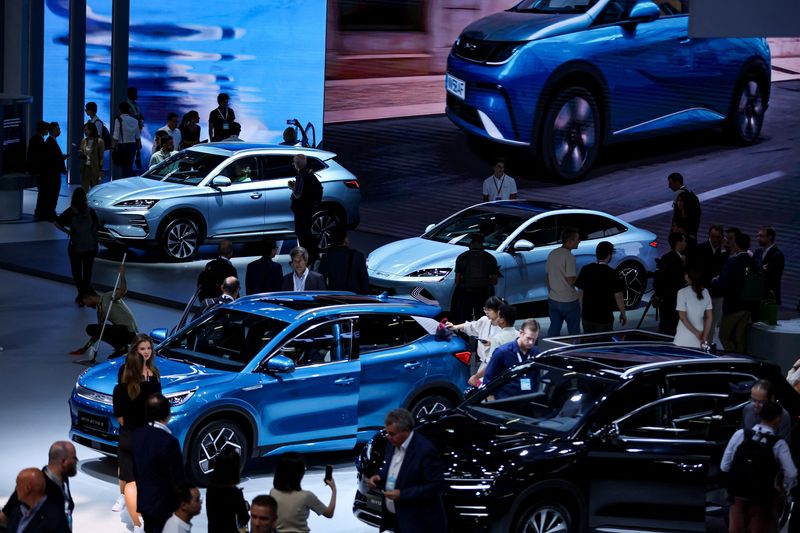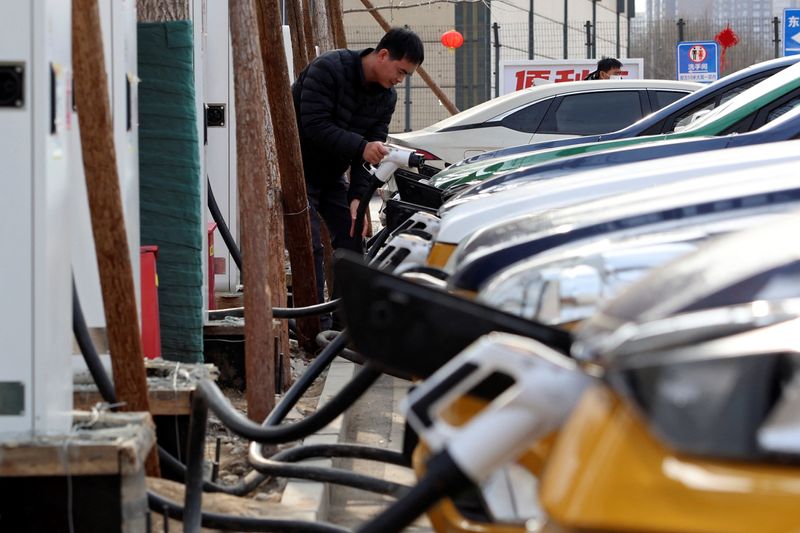By Liz Lee, Laurie Chen and Nick Carey
BEIJING (Reuters) -Beijing on Thursday slammed EU tariffs on Chinese electric vehicles as protectionist behaviour even as the country's top auto exporter said the duties would not derail its expansion plans for Europe, including making EVs in Spain this year.
The reaction from China and others embroiled in the dispute, including European and Chinese car makers, points to clear opposition to the EU decision and an eagerness to de-escalate the situation.
Industry insiders say both Europe and China have reasons for wanting to strike a deal in the months ahead to avoid the addition of billions of dollars in new costs for Chinese electric car makers, as the EU process allows for review.
China said it would take "all necessary measures" to safeguard its interests after the European Commission announced on Wednesday it would impose extra duties of up to 38.1% on imported Chinese electric cars from July.
"We urge the EU to listen carefully to the objective and rational voices from all walks of life, immediately correct its wrong practices, stop politicising economic and trade issues, and properly handle economic and trade frictions through dialogue and consultation," Chinese foreign ministry spokesperson Lin Jian said at a regular press briefing.
Even so, Chery Auto, China's largest automaker by export volume, appeared undeterred.
Charlie Zhang, vice president of Chery Auto and president of its European business, said the company plans to start EV production by year end at its recently acquired factory in Spain, the company's first manufacturing site in Europe.
He said that site will help offset the impact of the tariffs. Rivals BYD (SZ:002594) and Great Wall Motor are also looking to set up manufacturing and assembly plants in the region, aiming to blunt financial pain from the tariffs as they aim to ramp up sales of lower-cost cars to rival their European competitors and make up for slower sales in China.
ROOM TO FIND SOLUTION
Brussels seemed to have left some room for the two sides to continue consultations to find a solution, state news agency Xinhua said in a commentary, adding it hoped "the EU will make some serious reconsideration and stop going further in the wrong direction."
Beijing has rejected the EU and U.S. argument that overcapacity in China's EV industry has threatened overseas automakers through subsidised exports. It says tariffs will slow the uptake of electric vehicles, endanger climate-change goals and raise costs for consumers.
Brussels said it also would combat Chinese subsidies with additional tariffs ranging from 17.4% for BYD to 38.1% for SAIC, on top of the standard 10% car duty. That takes the highest overall rate to nearly 50%.
Washington also recently revealed plans to quadruple duties for Chinese EVs to 100%.
Other carmakers were more muted than Chery.
Geely, which has a majority stake in Sweden's Volvo (OTC:VLVLY) Car , expressed "great disappointment", vowing "all necessary measures" to safeguard its rights.
State-owned SAIC, which counts on joint ventures with Volkswagen (ETR:VOWG_p) and General Motors (NYSE:GM) to be China's largest automaker, said it was deeply concerned by the tariffs.
SAIC has been China’s biggest automaker for nearly two decades but its sales have come under pressure and it has been working to reduce headcount, Reuters has reported.
The EU has made clear that European regulators would view loans from Chinese state-owned banks and government ownership as subsidies subject to additional tariffs.
In a sign China has little intention of dialling back support, the government of the city of Shenzhen on Thursday announced measures to encourage integration of new vehicles with the electric grid, including subsidies of up to 15 million yuan ($2 million) for each vehicle-to-grid project.
NO DEATH BLOW
China's auto industry, a mix of state-owned and private firms, has cost advantages over foreign competitors due in part to government subsidies and the nation's dominance of battery-minerals refining, analysts say.
But the high level of competition in China's EV market, the world's largest, has also driven companies to innovate in ways that have brought down costs.
The EU provisional duties are set to apply by July 4, with the investigation due to continue until Nov. 2, when definitive duties, typically for five years, could be imposed.
Chinese EV maker stocks mostly shrugged off the news, which was expected. The Hong Kong-listed shares of BYD closed up 5.8%.
"The EU tariff hike result is slightly positive for BYD vs our previous tariff expectation of 30%, which improves BYD’s export growth visibility into 2Q/3Q24," Citi said in a research note.
Geely Auto rose 1.7% and Leap Motor gained 2.7% while Great Wall Motor's Hong Kong shares eased 1.2%. In Shanghai, shares of SAIC Motor fell 1.6%.
Joe Mazur, senior analyst at research consultancy Trivium China, said Chinese EV makers would be forced to pass along some of the cost increases to consumers.
"But it's by no means a death blow to the Chinese EV industry in Europe," he said.
Tesla (NASDAQ:TSLA) expects to increase its Model 3 prices because of the import duties on its China-made EVs.
Chinese automakers have charged more for exports than they have in their home market, offering some protection from the tariffs. BYD, for example, charges more than double — sometimes nearly triple — the price it gets for three key models in China.
While European automakers are being challenged by an influx of lower-cost EVs from Chinese rivals, there is virtually no support for tariffs from the continent's auto industry.
Some of the biggest opponents include Europe's largest automakers such as BMW (ETR:BMWG), Volkswagen, Stellantis (NYSE:STLA), and Mercedes Benz (ETR:MBGn).
German automakers in particular are heavily dependent on sales in China and fear retribution from Beijing. European auto firms also import their own Chinese-made vehicles.
Shares in some of Europe's biggest carmakers fell for a second day on Thursday due to fears of Chinese retaliation.
Volvo Car was the biggest faller, down more than 7%.
Concerns over retaliation spread beyond the auto sector, knocking shares in cognac maker Remy Cointreau. A trade body for French cognac producers expressed deep concern on Wednesday over the EU's tariff decision.
In January, China launched an anti-dumping investigation on EU brandy imports, in a move seen as a response to the widening trade disputes between Beijing and Brussels.

Global food companies from dairy producers to pork exporters are also on high alert for potential retaliation from China.
($1 = 7.2515 Chinese yuan renminbi)
